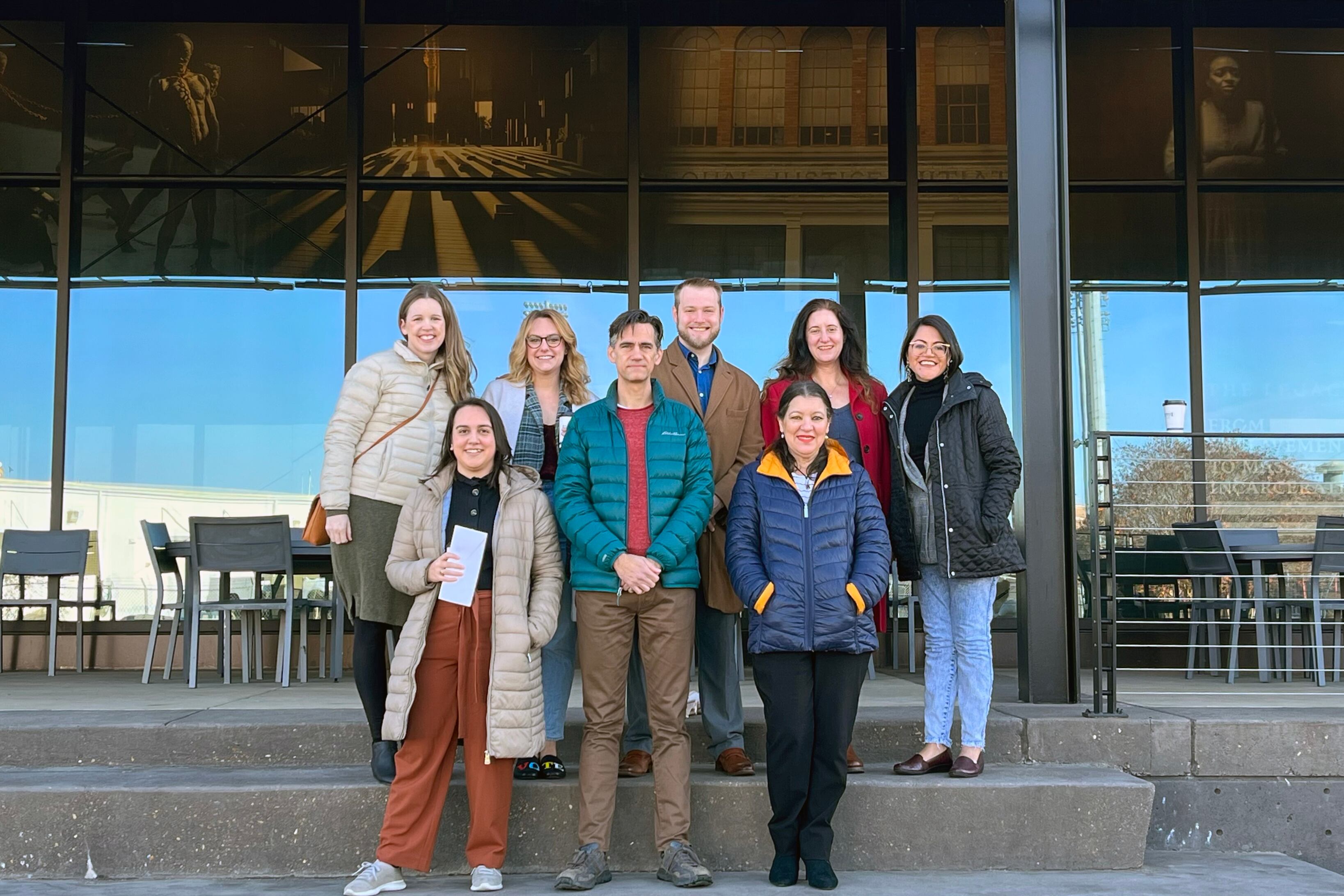Votebeat is a nonprofit news organization reporting on voting access and election administration across the U.S. A version of this post was originally distributed in Votebeat’s free weekly newsletter. Sign up to get it delivered to your inbox every Saturday.
Votebeat’s staff just got back from its first staff retreat, in Montgomery, Alabama. The trip was the first time we’d all gathered in one place together, and what a place to do it.
We spent time at the Legacy Museum and the National Memorial for Peace and Justice, sobering reminders of this country’s most shameful history. The museum walks visitors through time from the dawn of American slavery in 1619 to the present day injustice of mass incarceration, an immersive tour of the history of racial violence against Black people in the United States. The memorial is dedicated to lynching victims, whose names and counties are engraved on more than 800 steel monuments. Both are the work of the Equal Justice Initiative.
Both the museum and the memorial are among the most powerful places I’ve ever been. Both present America’s history of institutionalized racism clearly, honestly, and without attempting to blunt the horrors of the worst offenses. They also do not allow visitors the luxury of believing we’ve left these issues behind us. It was a privilege to be in these spaces with my colleagues, and I know that our work will be better for it — chiefly because, while humbling and deeply sad, these places are also symbols of hope.
The heroes of the civil rights movement — then and now — are people who embrace a kind of enduring optimism for the future, while refusing to water down the truth of the present. They are successful in forcing change because they refuse to accept that progress isn’t possible.
Martin Luther King Jr.’s six principles of nonviolence ends with this: “Nonviolence Believes That the Universe Is on the Side of Justice.” In other words, “the nonviolent resister has deep faith that justice will eventually win.” The museum and the memorial bear this out.
The individual exhibits on display are wrenching. A particularly moving display featured ads placed by enslaved or formerly enslaved people seeking family members they’d been separated from. Another offered tear-off literacy tests with real questions on them that you could take with you. The questions included, “How many gumballs are in this jar?” and “How many bubbles are in a bar of soap?”
But, collectively, they offer evidence of a pattern: Things get better. And they get better because of the people who tell the truth.
It is extremely easy to get bogged down in the difficulties, inequities, and struggles of right now. EJI’s work helped remind me that things are, on the whole, better than they once were, but not good enough. It will take more focused work on racial equity and optimism to keep making them better.
Our staff arrived at work this week ready to take on the world with our journalism, clear evidence that — at least for us — our time in Montgomery had the intended effect.
Ahead of 2024, we know an important part of our job will be assessing whether voting restrictions, and the fights over those restrictions, fall more heavily on some voters than others, especially communities of color. That clarity will help us see the forest for the trees as we enter what promises to be a tumultuous year.
Our newsletter will be back in your inbox in 2024. In the meantime, tell us where you think our time is best spent.
We’re preparing to cover the 2024 elections next year. What issues in voting should we focus on? What’s missing in election news? Help us decide what to cover by filling out our survey here.
New From Votebeat
From Votebeat Pennsylvania: Cancellation of project to upgrade Pa.’s outdated voter roll system leaves election officials with no relief in sight
From Votebeat National: Documents show Republican-led states struggling to clean voter rolls after leaving ERIC
In Other Voting News
- A Georgia election worker testified that she suffers from panic attacks and has been deluged by racist and threatening messages after former New York City Mayor Rudy Giuliani and other allies of former President Donald Trump falsely accused her of election fraud, the Associated Press reported. Shaye Moss and her mother, Ruby Freeman, sued Giuliani for defamation, seeking tens of millions of damages, and he has acknowledged in court that his claims were false, though he has continued to repeat some of them. Moss testified as part of a trial to determine how much Giuliani will have to pay.
- Rulings in several closely watched redistricting cases came down this week: New York’s highest court ruled the state must redraw its congressional map before the 2024 election, the New York Times reported, a decision seen as favoring Democratic prospects in the state and potentially affecting political control of the U.S. House. In Texas, the Supreme Court ruled local elections in Galveston will proceed for now under a map a lower court judge had found violated the Voting Rights Act, Houston Public Media reported. And in North Dakota, the state must redraw state legislative maps for tribal reservations so they comply with the Voting Rights Act by Dec. 22, KFYR TV reported.
- Election board members in Hinds County, Mississippi, agreed to hold a public meeting with civil rights groups on Dec. 18 to answer questions about why the county ran out of ballots during the November election, Mississippi Today reported.
- A Texas judge is ordering two local elections in the country’s least populous county to be held again after finding that 10 Loving County voters didn’t have enough of a connection to the area to vote there, the Houston Chronicle reported. A justice of the peace race and a county commissioner seat, both decided by single-digit margins, must be redone.
Jessica Huseman is Votebeat’s editorial director and is based in Dallas. Contact Jessica at jhuseman@votebeat.org.



